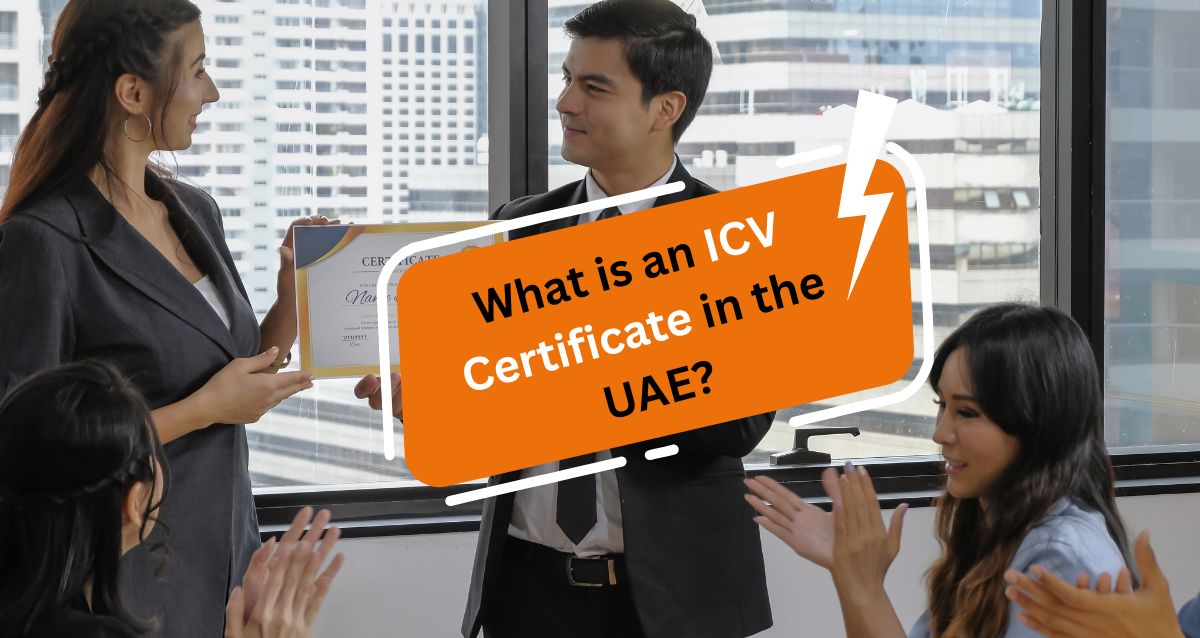ICV Certificate in the UAE
The UAE has become a hot destination for investors, multinational companies and new entrepreneurs looking for stability, strategic location and international market access. As part of its effort to boost local economic development, the UAE introduced the In-Country Value (ICV) Program, a national initiative that encourages companies to invest, hire and source within the UAE.
Many US companies expanding to the Middle East need an ICV certificate, but wonder: What is an ICV certificate? Why is it required? And how does the ICV certification process work?
This guide explains i.c.v. meaning, purpose, benefits, requirements and how businesses—especially those working with government-funded entities-can get the ICV certificate required by the authorities.

What Is an ICV Certificate?
In a nutshell, the ICV Certificate measures how much a company contributes to the UAE’s economy. If you’re searching for what an ICV certificate is, the simplest answer is:
It’s an official document that measures your company’s local economic impact based on spending, investment, Emiratization and sourcing within the UAE.
The ICV certificate is part of the UAE’s ICV Program, launched by ADNOC and later rolled out nationwide. It encourages companies to create value locally rather than relying on foreign services or imports.
Companies that get ICV certified get benefits in government procurement, tender eligibility, contract scoring and bid competitiveness.
What is I.C.V.?
i.c.v. means In-Country Value, which is the total economic benefit a company creates in the UAE.
The program assesses:
-
Local hires (Emiratization)
-
Local investments
-
Local supplier spending
-
Manufacturing in the UAE
-
Revenue retained in the country
-
Cost of goods or services sourced locally
When companies have high ICV scores, they have a better chance of winning contracts from government-linked entities such as:
-
ADNOC
-
Aldar
-
DEWA
-
Emirates Steel
-
Etisalat
-
Various ministries and federal agencies
Even private sector companies are now requesting the ICV certificate in Dubai for vendor pre-qualification.
Why the UAE Introduced ICV Certification?
The UAE government created the ICV model to achieve major economic objectives:
1. Increase domestic investment
Encourage companies to manufacture, hire and grow locally.
2. Strengthen economic sustainability
Reduce dependence on imports and external service providers.
3. Support job creation for Emiratis
Increase national participation in the workforce.
4. Encourage long-term partnerships
Align private companies with national development priorities.
5. Improve supply chain resilience
Build strong local supplier ecosystems to reduce operational risks.
The ICV certification has become a mandatory requirement for companies involved in energy, construction, technology, logistics and manufacturing.
Who Needs an ICV Certificate in the UAE?
Although it started as an ADNOC initiative, today the ICV Program applies across sectors. Companies that typically require ICV certification are:
-
Government contractors
-
Suppliers bidding for federal projects
-
Vendors working with UAE-based conglomerates
-
Industrial and manufacturing companies
-
Service-based companies in oil, gas and energy
-
International companies entering the UAE market
Even if not mandatory, having an ICV certificate in Dubai can boost your business reputation and competitiveness.
ICV Certification Benefits for Businesses
1. Higher Tender Scores
Government tenders evaluate applicants based on their ICV scores, so certified companies have a clear advantage.
2. More Contract Opportunities
Companies with high ICV scores are prioritised for federal and semi-government projects.
3. Better Brand Image
ICV certification shows your company supports the country’s growth.
4. Stronger Local Partnerships
Helps build trust with UAE-based customers and suppliers.
5. Long-Term ROI
Local sourcing and investment often lead to cost-efficient operations in the long run.
ICV Certification Process
Want to know more about the ICV certification process? Here’s a step-by-step guide:
Step 1: Prepare Financial Statements
Companies must submit audited financial statements as per UAE standards.
They must be:
-
Audited by a licensed auditor
-
Dated within the last 2 years
-
IFRS compliant
Small companies can use management accounts or simplified audit reports if allowed.
Step 2: Collect All Supporting Documents
You need to collect documents showing:
-
Local procurement
-
Emiratization records
-
Salary expenditure
-
Assets in the UAE
-
Investments in facilities
-
Depreciation schedules
-
Supplier information
This is the backbone of the ICV scoring model.
Step 3: Submit to an Approved Certification Body
The UAE has authorised specific certification firms to review and verify ICV data.
Your application will be evaluated as per the official ICV scoring framework.
Step 4: Scoring and Verification
The certification body will calculate:
-
Your ICV score
-
Financial impact
-
Contribution to the local economy
If required, the company can revise and resubmit documents.
Step 5: ICV Certificate Issuance
Once approved, your ICV certificate Dubai will be issued and is valid for 14 months from the date of the financial statements used.

ICV Scoring Components
The ICV score is based on the following performance indicators:
1. Goods Manufactured Locally
Higher percentage = higher score.
2. Services Provided Within the UAE
Local service-based revenue increases your score.
3. Emiratization
The number of Emirati employees and their salary expenditures are key factors.
4. Investment in Local Assets
Factories, machinery, offices and warehouses in the UAE contribute positively.
5. Local Procurement Spending
Purchases from UAE-based suppliers increase ICV value.
6. Expatriate Employee Spending
Lower expat costs and higher local hiring can boost scores.
Since all this affects tender evaluation, companies try to optimise their operational structure before applying.
Challenges Companies Face in the ICV Certification Process
Many companies-especially US-based companies new to the region-face the following challenges:
-
Understanding UAE auditing standards
-
Incomplete documentation
-
Misinterpretation of ICV scoring guidelines
-
Delayed certification due to compliance gaps
-
Lack of strategic planning for higher ICV scores
That’s why expert consulting is highly recommended to navigate the process smoothly.
Best Practices for Boosting Your ICV Score
1. Local Procurement
Buy from UAE-based suppliers whenever possible.
2. Local Workforce
Hiring and training Emiratis increases your ICV value.
3. UAE-Based Infrastructure
Warehouses, factories and offices directly impact scoring.
4. Clean Audited Financial Statements
Accurate, UAE-compliant audits avoid delays.
5. Long-Term Operational Strategy
Plan procurement, hiring and investments to boost ICV impact over time.
Conclusion
Understanding ICV certification, its purpose and the ICV certification process is crucial for any business that wants to operate in the UAE. From procurement benefits to higher tender scores, an ICV certificate in Dubai can make a big difference—especially for US businesses entering the region.
How Flyingcolour Tax Consultant Can Help You?
Flyingcolour Tax Consultant guides companies through every stage of ICV certification. Our team assists with:
-
Preparing and reviewing financial statements
-
Ensuring full compliance with ICV rules
-
Completing documentation for ICV submission
-
Coordinating with approved certifying bodies
-
Designing strategies to improve future ICV scores
-
Advisory on procurement, investment and operational changes
With deep UAE market knowledge and years of certification experience, Flyingcolour Tax Consultant ensures your business gets an ICV certificate quickly-so you can stay competitive, compliant and ready for long-term success.
FAQ
1. Why do U.S. companies operating in Dubai need an ICV certificate?
Many government and semi-government entities in the UAE require the ICV certificate for contract eligibility. U.S. companies working on large-scale projects benefit from higher tender scores and stronger credibility.
2. How long does the ICV certification process take?
On average, the process takes 2-4 weeks, depending on the completeness of your documents and financial statements.
3. What documents are needed for ICV certification?
Companies must provide audited financial statements, payroll records, procurement lists, investment documents, and operational expenses supporting their ICV score.
4. Is the ICV certificate mandatory for all businesses in the UAE?
Not all industries require it, but businesses dealing with government, oil & gas, construction, infrastructure, or major corporate entities must obtain ICV certification to remain competitive.
5. How long is the ICV certificate valid in Dubai?
The certificate is valid for 14 months from the date of the audited financial statements used in the certification.
To learn more about What is an ICV Certificate in the UAE?, book a free consultation with one of the Flyingcolour team advisors.
Disclaimer: The information provided in this blog is based on our understanding of current tax laws and regulations. It is intended for general informational purposes only and does not constitute professional tax advice, consultation, or representation. The author and publisher are not responsible for any errors or omissions, or for any actions taken based on the information contained in this blog.


